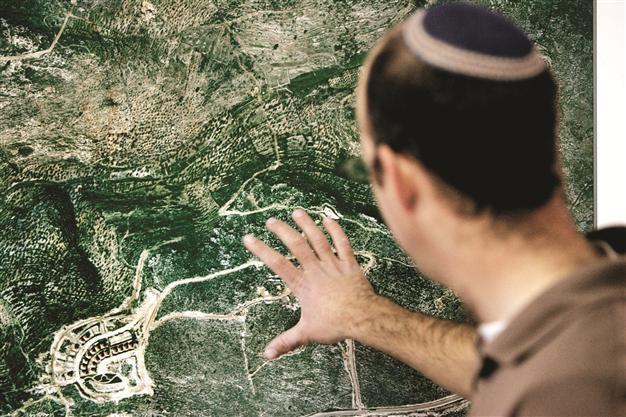Israel’s settlement bid bombards peace process
JERUSALEM / GAZA

In this 2007 file photo, Israeli Amishai Shav-Tal, 31, one of the founders of the West Bank Jewish settlement of Bruchin looks at an aerial photo of the settlement. AP photo
Israel legalized three settler outposts in the West Bank yesterday, a decision Palestinians have denounced as a response to a letter from Palestinian Authority President Mahmoud Abbas demanding a halt to settlement activity if peace talks resume.A ministerial committee decided “to formalize the status of three communities which were established in the 1990s,” the office of Israeli Prime Minister Benjamin Netanyahu said. Palestinians and the Israeli settlement watchdog Peace Now have angrily denounced the move. Peace Now said it was the first time Israel had created new settlements in more than 20 years.
The three outposts, Bruchin, Rechelim and Sansana will now join the 120 official settlements dotted across the occupied West Bank which are home to more than 342,000 people.
The Palestinian leadership said the decision was “expected” and that it was “the Israeli answer” to a letter to Netanyahu from Abbas, in which the Palestinian Authority president laid out Palestinian grievances over the collapse of the peace process and outlined his demands for restarting negotiations. Central to the letter was the demand for a settlement freeze.
The Israeli announcement came as United States envoy David Hale was in the region on a new mission to restart negotiations. “The decision on the settlements is the Israeli answer to President Abbas’ letter,” presidential spokesman Nabil Abu Rudeina told Agence France-Presse, urging the Netanyahu administration to “immediately cease unilateral actions, especially settlement activity.”
In the letter, delivered to Netanyahu on April 17, Abbas demanded that Israel clarify its position on several key issues, including the principle of a two-state solution based on the pre-1967 lines and halting settlement activity. Both sides agreed the Israelis would respond within two weeks, but an official insisted the decision did not mean Israel had established any new settlements.
Hamas chooses Haniyeh in secret election: daily
“This decision does not change the reality on the ground,” he said. “It does not establish new settlements or expand existing settlements.” Meanwhile, Hamas recently held secret elections for the leadership of the organization’s Gaza political bureau and chose Hamas Prime Minister Ismail Haniyeh, according to Israeli daily Haaretz.
Haniyeh won the race by a significant margin. The win, in effect, makes Haniyeh the Gaza Strip’s first recognized Hamas political leader since Israel’s assassination of Hamas’ former Gaza political chief Abdel Aziz al-Rantissi in 2004.Hamas officials said the covert elections were held less than two weeks ago, in which voters elected the 77 members of the group’s advisory council in Gaza, as well as the 15 members of the Gaza Strip’s Hamas politburo, Gaza’s most powerful political institution.
Last December, Hamas chief Khaled Mashaal indicated that he would not seek re-election as the organization’s political leader in forthcoming elections.
















